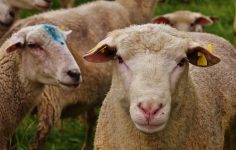Verbal abuse of sheep: Has the world gone mad?

It was a news story that swept the world, with pun headlines to match.
ABC Rural published a story about alleged verbal abuse of sheep, raising the question of whether sheep could understand English.
It reported that the activist group People for the Ethical Treatment of Animals (PETA) lodged a complaint with the RSPCA in NSW, saying that it had obtained secret footage of sheep on a NSW station being allegedly sworn at whilst in a shearing shed.
The report quoted Ken Turner, the operator of the station, saying that “the allegation was that bad language was used by an employee on the property in front of the sheep, and that they could have been offended by the use of bad language.”
The RSPCA subsequently decided that the video footage would likely be inadmissible as evidence of the abuse and on that basis decided to withdraw the charges.
The report also went on to quote animal experts about whether sheep could actually comprehend English.
This is just the kind of story that media outlets love. There’s a bit of Australiana to engage overseas audiences, and it’s got a crazy element to it as well. Were the sheep offended by the bad language? Could they really understand English? It’s all very tongue-in-cheek.
Not surprisingly, there was plenty of fodder for the headline writers, who came up with these gems:
- “Aussie Sheep Station Under Fire For Cursing At Animals”.
- “How dare ewe: shear rudeness against sheep”.
- “Inequality on the rise as sheep abuse rears its ugly head”.
But really, when you think about it, there must have been more to the story. The RSPCA, like so many other organisations, is strapped for cash and resources. Would it really have taken action for activity that some media organisations had portrayed as so trivial?
Probably not. The truth is, it probably couldn’t afford to. So what actually happened?
The rest of the story
ABC’s Media Watch, the unofficial watchdog and conscience of media publications in their various forms, shed some light.
What had actually happened was that PETA had lodged a complaint with the RSPCA based on what had been recorded in the video footage. There were a number of acts of brutality against the sheep, including one incident in which a shearer was swearing at the sheep as he beat them. This is what ABC Rural picked up on and ran as the key element of its story.
Before the publication of the story, PETA had issued a statement to ABC Rural saying that the complaint:
detailed instances in which shearers working at Boorungie Station punched sheep in the face, punched a lamb in the torso, stomped and stood on sheep’s heads and necks, struck them with a pipe and electric clippers until they bled, picked up one sheep by the hind legs and threw her head first through a gate, and crudely stitched up gaping wounds without any pain relief. And yes, one shearer was cursing at the animals as he beat them.
It is, in fact, a shocking account of animal abuse. With this detail, it is clear why the RSPCA took an interest in the complaint.
Media Watch made the point that ABC Rural was well aware of the real allegations because part of the same PETA statement was quoted in ABC Rural’s report:
If foul language were the worst that sheep in Australian shearing sheds had to endure, then no complaint would have been filed.
So, as it turns out, what is shocking about this story is that there was an allegation of real and serious abuse that went largely unreported. It was preferable to get a bit of a laugh by raising the possibility that the delicate sensitivities of sheep may have been offended by the fruity language of a couple of larrikin shearers.
Can animals understand language?
It is common ground that more intelligent animals, such as dogs, can understand that they are being verbally abused. But what they are picking up is body language and tone of voice, rather than actually being able to understand what is said to them.
They may respond to verbal abuse by becoming withdrawn, developing behavioural problems (for example, failing to respond to commands or defecating inside the home), or becoming aggressive.
Although sheep are not as intelligent as dogs and do not generally share close bonds with their owners, it is possible that they may also negatively respond to being yelled at.
But the RSPCA’s limited resources are never likely to be spent on prosecuting such cases, as other far more serious instances of animal cruelty are rife throughout the country.
Legislation
Animal cruelty is a very serious issue and is covered in NSW by the Prevention of Cruelty to Animals Act 1979 and also section 530 of the Crimes Act, which prescribes a maximum penalty of 5 years imprisonment.
No doubt PETA and the RSPCA would have preferred its complaint of animal cruelty to have been taken seriously by the media.
It is hugely disappointing that the issue became so trivialised by the attraction of pun headlines and a mocking angle to the story. But it is clear that the world has not gone mad; just some sections of the media.






